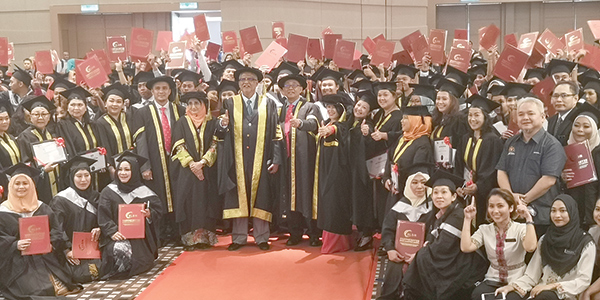Manpower needs: Ministry ready to assist sectors
Published on: Sunday, September 15, 2019
By: Hayati Dzulkifli

KOTA KINABALU: The Human Resources Ministry is willing to work with the plantation and construction sectors in Sabah to help provide skilled manpower to meet an anticipated shortage when the proposed relocation of Indonesian capital city to East Kalimantan is realised.
Its Deputy Minister Datuk Mahfuz Omar said his Ministry was prepared to face a possible shortage of manpower in the two sectors.
ADVERTISEMENT
He said the Ministry would help by providing skills training to meet the manpower needs of companies in both sectors.
“I was made to understand that we have rendered similar assistance to two companies operating oil palm plantations in Tawau, namely Sabah Softwoods Berhad and Benta Wawasan, in skills training programmes to ensure sufficient skilled manpower.
“We hope more companies will also send their workers to undergo training either for upskilling (enhancing existing skills) or reskilling (learning new skills),” he told a press conference after officiating the 4th Convocation of the National Dual Training System (SLDN) for Sabah and Labuan at Mariott Hotel, here, Saturday.
Last month, Indonesian President Joko Widodo announced a plan in Parliament to move the country’s capital from Jakarta Java Island to Kalimantan.
ADVERTISEMENT
The convocation saw a total of 242 graduates receiving their certification, out of whom 238 obtained their Malaysia Skills Certificate (SKM) for Level 2 (79 graduates) and Level 3 (159), while two received Malaysia Skill Diploma (DKM) and another two for Malaysia Skill Advance Diploma (DLKM) in various fields in 23 SLDN training centres in Sabah and Labuan.
According to Mahfuz, the SLDN programme, which was implemented since 2005 and adopted from a Jerman’s apprentice model, is a platform to generate skilled human capital for the country by combining practical training or hands-on in companies while the theories are learned in training centres.
ADVERTISEMENT
“Each apprentice who successfully took the SLDN training will be awarded with SKM, DKM or DLKM in registered sectors if competent with the National Occupation Skill Standard (NOSS).
“As of now, SLDN has trained 111,398 apprentices involving accreditation of 8,470 companies, of which 1,127 companies are still active.
“In Sabah, over 10 per cent of the figure (111,398) participated in the programme with over 20 accredited companies and training centres that are taking part in the programme,” he said.
Skill Development Department Deputy Director-General (Development), Suimi Abd Majid, said the SLDN programme in Sabah is promoting various skill training courses to companies or industry players.
“So far, we are pleased with the response from the employers towards the SLDN programme.”
As for the courses offered by SLDN programme in Sabah, Sabah and Labuan Skill Training Centre Association Chairman Stella Matuya said there are about 22 famous skill training courses provided under the SLDN programme in the State and Labuan that are more on acquiring soft skills, including in hospitality fields.
Among the courses, she said, are beauty therapy, hairstyling, aromatherapy, housekeeping operation, office management, tailoring in men and women clothing, sales and marketing operations, repairing air-conditioning, automotive, child care and accounting, among others.
Mahfuz said the implementation of the SLDN programme is in line with the aspiration of the Ministry to enhance job training for locals through upskilling and reskilling to achieving the target of generating 1.2 skilled workers in the country in various industries under 11th Malaysia Plan (11MP) that will end next year.
To a question, he said his Ministry has a plan to put in other sectors or industries in the SLDN programme to be in line with the Industrial Revolution 4.0.
Stay up-to-date by following Daily Express’s Telegram channel.
Daily Express Malaysia




